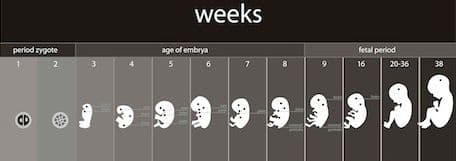Fetal Weight Calculator
Ultrasound Tools
Obie Editorial Team

Will you have a big baby? Is your baby on the small side? And just how big will your baby be at birth? This Fetal Weight Calculator calculates the size and weight of your unborn baby and helps you to keep track of your baby's growth in the womb.
What the best way to determine fetal weight?
Prenatal ultrasound is used as a diagnostic tool and means of collecting information, such as fetal weight and pregnancy due date. According to researchers from the University Hospital Brugmann in Brussels, a fetal ultrasound may not be the most effective method of estimating fetal weight.
The study measured the weight of 188 fetuses ranging from 20 weeks and 42 weeks gestation. Sex and fetal density were taken into consideration before the final analysis was reported. Weight per prenatal ultrasound was calculated using the Hadlock et al method. Weight per magnetic imaging was calculated using the Baker et al method.
The gap between actual fetal weight at birth and ultrasound measurements was more than 10% while magnetic resonance imaging provided a closer estimation of fetal weight. Error in fetal weight estimation via magnetic resonance imaging occurred in less than 2% of cases. Magnetic resonance fetal weight estimates are more accurate than prenatal ultrasound measurements.
Is fetal weight linked to conception?
A new study links fetal birth weight to the type of conception. According to the study, infants conceived using fertility treatments are significantly smaller than infants born after natural conception. The study included 1,700 women who gave birth to one child. Multiple pregnancies were not used in the study because multiple pregnancies tend to result in lower birth weight babies. The research study revealed that women utilizing fertility treatments to conceive gave birth to infants that were roughly 1/3 of a pound lighter than women who gave birth to infants conceived naturally.
The study group included about 460 women who were treated at a fertility clinic for fertility problems. The women were treated with in-vitro fertilization and fertility drugs. About 100 of the women conceived naturally, without treatment. The women in the study group were compared to just less than 1,300 women who conceived naturally without fertility problems. Prenatal ultrasound is used as a diagnostic tool and means of collecting information, such as fetal weight and due date. According to researchers from the University Hospital Brugmann in Brussels, fetal ultrasound may not be the most effective method of estimating fetal weight.
Source: Kacem Y, Cannie MM, Kadji C, Dobrescu O, Lo Zito L, Ziane S, Strizek B, Evrard AS, Gubana F, Gucciardo L, Staelens R, Jani JC. Fetal Weight Estimation: Comparison of Two-dimensional US and MR Imaging Assessments. Radiology. 2013 Jan 17.
Read More











